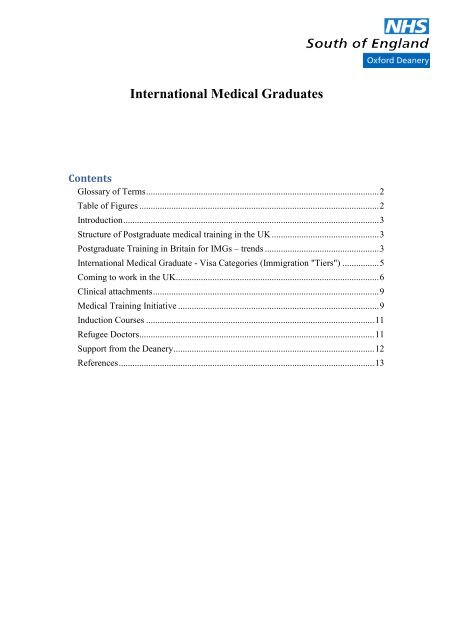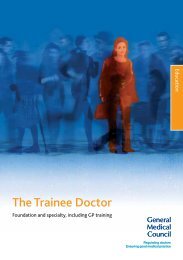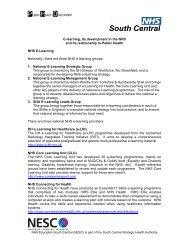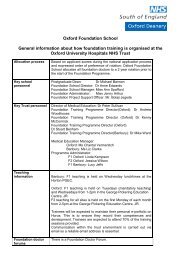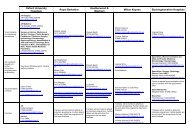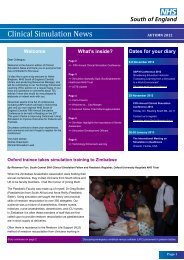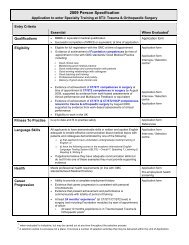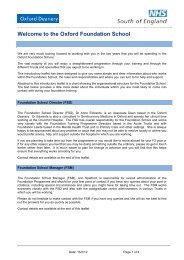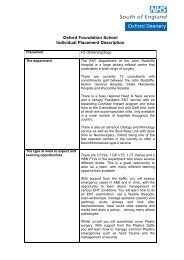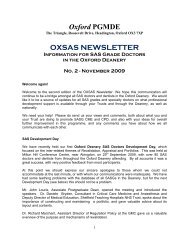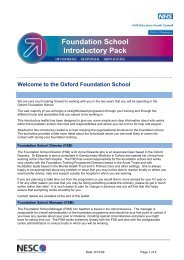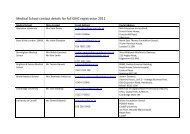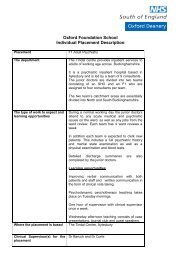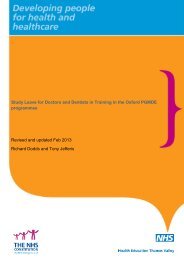IMGs Policy - Oxford Deanery
IMGs Policy - Oxford Deanery
IMGs Policy - Oxford Deanery
Create successful ePaper yourself
Turn your PDF publications into a flip-book with our unique Google optimized e-Paper software.
International Medical GraduatesContentsGlossary of Terms ...................................................................................................... 2Table of Figures ......................................................................................................... 2Introduction ................................................................................................................ 3Structure of Postgraduate medical training in the UK ............................................... 3Postgraduate Training in Britain for <strong>IMGs</strong> – trends .................................................. 3International Medical Graduate - Visa Categories (Immigration "Tiers") ................ 5Coming to work in the UK ......................................................................................... 6Clinical attachments ................................................................................................... 9Medical Training Initiative ........................................................................................ 9Induction Courses .................................................................................................... 11Refugee Doctors ....................................................................................................... 11Support from the <strong>Deanery</strong> ........................................................................................ 12References ................................................................................................................ 13
Dr Amit Gupta (Associate Dean, <strong>Oxford</strong> <strong>Deanery</strong>) October 4 2012Glossary of Terms1. AoMRC -Academy of Medical Royal Colleges (www.aomrc.org.uk)2. BMA-British Medical Association (www.bma.org.uk)3. CDU – Career Development Unit4. CoS – Certificate of Sponsorship5. COPMeD- The Conference of Postgraduate Medical Deans of theUnited Kingdom (http://www.copmed.org.uk/)6. EEA – European Economic Area7. GMC- General Medical Council (www.gmc-uk.org)8. IELTS - International English Language Testing System9. IMG - International Medical Graduate10. MEE- Medical Education England (www.mee.nhs.uk)11. MMC - Modernising Medical Careers (www.mmc.nhs.uk)12. MTI – Medical Training Initiative (www.aomrc.org.uk)13. NACPDE -The National Advice Centre for Postgraduate DentalEducation14. NACPME -The National Advice Centre for Postgraduate MedicalEducation15. NHS employer’s (http://www.nhsemployers.org)16. PLAB (Professional and Linguistic Assessment Board)17. RMLT- Resident Labour Market Test18. UKBA – United Kingdom Borders Agency(www.ukba.homeoffice.gov.uk)Table of FiguresFigure 1. Number of doctors from countries with over 1,000 doctors on theregister in 2011Figure 2. Different tiers for different work categoriesFigure 3. Working in the UK – routes and visas468
Dr Amit Gupta (Associate Dean, <strong>Oxford</strong> <strong>Deanery</strong>) October 4 2012IntroductionThe <strong>Oxford</strong> <strong>Deanery</strong> welcomes international doctors and dentists (the latterare included in the following pages where the term "doctor" alone appears).There is a long tradition of postgraduate training in Britain of overseasqualifiedmedical professionals, including those who have come to this countryas refugees or are seeking asylum. Over the recent years there have beenkey changes in the composition and numbers of international medicalgraduates which are discussed in this report.For the purposes of this document an international medical graduate isdefined as1. Doctors/dentists who have an acceptable overseas qualification andwho are nationals of countries outside the UK, the EEA andSwitzerland2. Doctors/dentists who have completed their graduate medical schoolingin the UK but are nationals of countries outside the UK, the EEA andSwitzerlandStructure of Postgraduate medical training in the UKPost graduate training is overseen by a total of 14 Deaneries, which coverspecified geographical areas. The <strong>Oxford</strong> <strong>Deanery</strong> currently includes fivemajor hospital Trusts: <strong>Oxford</strong> University Hospitals (including the HortonHospital, Banbury), Buckinghamshire Healthcare (High Wycombe and StokeMandeville, Aylesbury), Royal Berkshire (Reading), Heatherwood andWexham Park (Slough) and Milton Keynes. The total population served isaround 2.5 million. Major organisational changes are underway in relation topostgraduate training nationally, and the exact future of Deaneries beyondApril 2013 remains under review. The reader is advised to consult thewebsite of Medical Education England (MEE) (www.mee.nhs.uk) for up-todateinformation.Postgraduate Training in Britain for <strong>IMGs</strong> – trendsInternational medical graduates constitute 32% of the medical workforce withmore than one-in-three hospital doctors and one-in-five general practitionershaving qualified overseas. 1Figure 1 shows the number (all grades of doctors including consultants, andGeneral Practitioners) of overseas doctors on the General Medical Councilregister on 31 December 2011.
Dr Amit Gupta (Associate Dean, <strong>Oxford</strong> <strong>Deanery</strong>) October 4 2012Information about the selection and recruitment process for postgraduatetraining, including the timing of entry, can be found on the ModernisingMedical Careers website, www.mmc.nhs.uk. This website should in all casesbe consulted carefully before making any enquiries from individual Deaneries,Hospitals, and Royal Colleges, other organisations or individual consultants,as the answers to many frequently asked questions can be found through thiswebsite and its associated links.International Medical Graduate - Visa Categories (Immigration "Tiers")Visa categories are divided into various Tiers by the UKBA. A briefdescription of the Tiers is given below. Please note that Tier I has beenabolished and Tiers 2, 4 and 5 are the relevant categories applicable tointernational medical graduates.Resident Labour Market Test is designed to test if there are UK/EEAdoctors/dentists available/applied to the job in question. Details of the RMLTare available on the NHS employer’s website (http://www.nhsemployers.org)Foundation ProgrammeRoleUK medical and dental schoolgraduatesInternational medical and dentalgraduatesTierTier 4 UK Foundation ProgrammeOffice (medical) and the Yorkshireand Humber SHA (dentistry) areresponsible for sponsorshipTier 2 (general): Skilled worker,Resident Labour Market TestapplicableCompleted Foundation Programme, moving specialty training or othermedical postsRoleTierUK medical and dental school Tier 2 (general) – resident labourgraduatesmarket testInternational medical and dentalgraduatesDoctors on Medical Training Initiative(MTI).not applicableTier 2 (general) – resident labourmarket testapplicable.Tier 5 The Academy of Medical RoyalColleges(AoMRC) administers the schemeClinical attachments. Outside of points-based system.Visitor visacategoryDoctors taking PLAB.. Outside of points-based system.Business visitorcategory.Temporary workers, including locums,filling gaps in the skilled labourTier 2 (general): skilled worker
Dr Amit Gupta (Associate Dean, <strong>Oxford</strong> <strong>Deanery</strong>) October 4 2012market.Figure 2. Different tiers for different work categories 3Tier 2This tier is open for <strong>IMGs</strong> if the post fulfils the RMLT. The applicant musthave a job offer and have sufficient points to be eligible for this visa category.There is a current country-wide limit of 20,700 individuals in this visa category.A "Certificate of Sponsorship" (CoS) is required, provided either by the<strong>Deanery</strong> (the <strong>Oxford</strong> <strong>Deanery</strong> is registered as a sponsor) or by the Lead Trustin some other Deaneries. The CoS lasts for 3 years, and can be extended for2 years. An application for permanent resident status can be made after 5years.Separate regulations are in place for nationals of Bulgaria and Romania ("A2Nationals"). Nationals from these countries need to apply for an “accessionworker card” details are available via the UKBA website (see above).Tier 4Foreign nationals who are graduates of UK medical schools are grantedLeave to Remain under a Tier 4 visa, for the duration of the FP (2 years afterqualification). The sponsor for doctors under this visa Tier is the UKFoundation Programme Office. A supporting letter from the <strong>Deanery</strong> isrequired to obtain this visa and should be applied for well in advance of takingup the first FP post.Tier 5This visa category comes under the UKBA heading of "Youth Mobility andTemporary Workers", and is only relevant, as far as doctors and dentists areconcerned, to those entering the UK on the MTI Scheme (see below). Thesponsor is the Academy of Medical Royal Colleges.Coming to work in the UKIf you are an IMG who is from outside the UK/EEA and thus do not have rightof UK residence, you will require firstly to confirm that your primary medicalqualification is accepted by the GMC for registration as a medical practitioner.Guidance on this can be obtained from the GMC's website www.gmc-org.uk.Assuming that your primary qualification is registrable with the GMC, the usualroute into postgraduate training for <strong>IMGs</strong> is still via the PLAB (Professionaland Linguistic Assessment Board) examination, for which a prerequisite is apass in the IELTS (International English Language Testing System)test. Details of the requirements can be found on the GMC website, and byfollowing the related web-links.The flowchart below summarises various routes to coming and working in theUK. The rules covered in the chart are not exhaustive and a candidate isadvised to contact the relevant body for detailed information especially if yourcircumstances do not fit clearly in the boxes on the flow chart.
Dr Amit Gupta (Associate Dean, <strong>Oxford</strong> <strong>Deanery</strong>) October 4 2012Further information is available by contacting the relevant College or SpecialtyAssociation (e.g. Royal College of Surgeons, Royal College of Physicians,etc.), whose addresses and websites will be available through your localBritish Embassy or Consulate, or British Council office, if you are still in yourhome country. They can also easily be found through any major searchengine such as Google. These Colleges and Specialty Associations will giveyou more detailed information and advice about training opportunities andcareer choices in their fields.
Figure 3. Working in the UK – routes and visas
There is also much useful information available from the InternationalDepartment of the British Medical Association (BMA), which can be contactedon international.info@bma.org.uk. Virtually all medical posts and trainingprogrammes are advertised in the Careers section of the British MedicalJournal (www.careers.bmj.com). The BMA also publishes a very usefuldocument entitled: "Working and Training in the United Kingdom NationalHealth Service - a guide for International Medical Graduates (<strong>IMGs</strong>)",available through its website www.bma.org.uk.Individual <strong>Deanery</strong> websites around the country will also be able to providefurther more localised information. Contact details for all the UK Deaneriesare available from the Conference of Postgraduate Medical Deans(COPMeD), through their website at www.copmed.org.uk.Please note that The <strong>Oxford</strong> <strong>Deanery</strong> (and others) cannot make directarrangements for training posts or programmes in the NHS, as these areadvertised nationally and are appointed as a result of competitive interview.Nor can the <strong>Deanery</strong> offer research posts, for which application must be madedirectly to an individual department. Clinical attachments, or observerships(see below) can only be arranged by making direct contact with individualconsultants, or sometimes through the Clinical Tutor or Director of MedicalEducation in each Trust (hospital). These provide a useful introduction toworking in the NHS, and may be helpful to obtain a UK referee when applyingfor jobs.Clinical attachmentsEnquiries are regularly received about the possibility of undertaking clinicalattachments in the <strong>Oxford</strong> <strong>Deanery</strong>. It is certainly very useful to have done aclinical attachment (observership) for a few weeks prior to working in the UK forthe first time, but the only way to arrange this is by direct contact with aconsultant (or GP). There is no centralised system for making thesearrangements, and the advice given to applicants is to get in touch with theClinical Tutor in the Postgraduate Centre of a hospital in the area preferred forthe attachment. The Clinical Tutor (or sometimes the Postgraduate CentreManager) should be able to advise as to which consultants might be able tohelp. Contact details for the Clinical Tutors can be found on the main <strong>Deanery</strong>website. The <strong>Deanery</strong> itself is unable to arrange clinical attachments for you.You should note that some hospitals may make a charge for suchobserverships, and all will require payment for accommodation, which is notnormally provided by the hospital itself.Medical Training InitiativeThe Medical Training Initiative (MTI) is a scheme designed to enable asmall number of International Medical and Dental Graduates to enter the UKto experience training and development in the NHS for up to two years –before returning to their home country.
Dr Amit Gupta (Associate Dean, <strong>Oxford</strong> <strong>Deanery</strong>) October 4 2012Under the scheme a number of places (currently a maximum of 750 overall)are made available for the training and development of overseas doctors anddentists – using training capacity not required for planned UK/EEA trainingnumbers.Employers do not sponsor this scheme; instead these posts are approved byDeaneries and the relevant Medical or Surgical Royal College. Themanagement of the MTI is a joint approach between the Medical RoyalColleges, Postgraduate Deaneries, NHS Trusts and the Academy of MedicalRoyal Colleges (AoMRC), with support from the Department of Health. TheNational Advice Centre for Postgraduate Dental Education (NACPDE)manages all dental posts.The MTI scheme accommodates overseas postgraduate doctors (known asInternational Training Fellows) coming to the UK for a maximum of two yearsfor further training. It covers the schemes and arrangements sponsored oradministered by the Medical Royal Colleges (e.g. the Overseas DoctorsTraining Scheme, or ODTS) and similar organisations (e.g. CommonwealthScholarships), as well as established fellowships in different specialties.The training must be of high quality with appropriate supervision, learningopportunities, assessment and appraisal. The presence of the fellow must notadversely affect the training opportunities of existing trainees on theprogramme. Salary must be provided at the level of at least the UK minimumwage, and if any service activities are undertaken by the fellow these must beremunerated at standard NHS rates. Entry to the UK is under a Tier 5 visa(sponsored by the AoMRC), and doctors on the scheme are exempt from thePLAB examination.A supporting form provided by the AoMRC, signed by the supervisingconsultant and the <strong>Deanery</strong> must accompany any application. The form mustalso be completed by the Medical Personnel department of the employingTrust.Application must be made from overseas, and the doctor must returnoverseas at the end of a maximum of two years. Time spent on the MTIScheme does not count towards residence status in the UK for settlementpurposes. There are also regulations regarding the length of time before thedoctor is permitted to return to the UK. Further details of the scheme areavailable from the AoMRC (for doctors) and NACPDE (for dentists). Thecontacts are:MTI SchemeAcademy of Medical Royal Colleges35-43 Lincolns Inn FieldLondon WC2A 3PEEmail: MTI@aomrc.org.ukwww.aomrc.org.ukMTI Scheme (Dentists)
Dr Amit Gupta (Associate Dean, <strong>Oxford</strong> <strong>Deanery</strong>) October 4 2012The Royal College of Surgeons of England35-43 Lincoln’s Inn FieldsLondon WC2A 3PEEmail: NACPDE@rcseng.ac.ukhttp://www.rcseng.ac.uk/fds/training-advice/nacpde.Induction CoursesThe <strong>Oxford</strong> <strong>Deanery</strong> no longer runs Induction Courses specifically for <strong>IMGs</strong>.The Wessex <strong>Deanery</strong> does still run these courses, normally twice a year, onthe Isle of Wight, and is happy to accommodate any new <strong>IMGs</strong> (from Europeor outside) who might benefit. The contact is Lyn Elderfield atlyn.elderfield@iow.nhs.uk. There is not yet any formal induction process forMTI trainees (International Training Fellows), but the GMC and BMA areconsidering setting up an electronic system. The contact at the AoMRC forthe MTI Scheme is Carol Sheppard (carol.sheppard@aomrc.org.uk). Thereis more information via the AoMRC website.The BMA's very useful document entitled: "Working and Training in the UnitedKingdom National Health Service - a guide for International MedicalGraduates (<strong>IMGs</strong>)", available through its website, should also be consulted.In addition, each Trust runs its own locally-based Induction Programme,normally on the first day or two days at the start of the new appointments (inthe first week of August). Attendance at this is compulsory, as it will provideall the vital local information about working in that particular Trust.Refugee DoctorsThe <strong>Oxford</strong> <strong>Deanery</strong> also provides help for refugee and asylum-seekingdoctors based in the <strong>Oxford</strong> area, through the <strong>Oxford</strong> Refugee HealthProfessionals Support Project. This was established in 2002, and since thenhas assisted several dozen health professionals, including doctors, dentists,nurses and midwives, to start retraining with the goal of using their healthcareskills in NHS employment.The Project can help by providing assistance with preparation for the IELTSand PLAB exams, career guidance, and advice on CV presentation andinterview skills. In some cases it has been possible to arrange further supportthrough communication skills courses, clinical attachments, and employment inparamedical posts as a stepping-stone to obtaining full professional jobs in thefuture. Several Project members are now in full-time employment as doctors inthe NHS.The Project is overseen by the Associate Postgraduate Dean for <strong>IMGs</strong>, and isadministered through Refugee Resource, an <strong>Oxford</strong>-based charity servingrefugees and asylum-seekers in a variety of ways. In the first instance,
Dr Amit Gupta (Associate Dean, <strong>Oxford</strong> <strong>Deanery</strong>) October 4 2012contact should be made with Michele Toler, Employment Services Coordinator,Refugee Resource, Old Music Hall, 106-108 Cowley Road, <strong>Oxford</strong>OX4 1JE (tel. 01865 403280 or 0845 458- 0055;micheletoler@refugeeresource.org).Support from the <strong>Deanery</strong>The <strong>Deanery</strong>'s Associate Director for Overseas Doctors (<strong>IMGs</strong>), Dr AmitGupta has responsibility for matters specific to doctors who have qualifiedoutside the UK, whether in the EEA countries or elsewhere, or whosenationality does not allow automatic right of permanent residence in the UK.These include:* guidance regarding visa status* career guidance in relation to overseas status* advice in connection with training and non-training posts* assistance with the Medical Training Initiative Scheme* provision of induction for <strong>IMGs</strong>* advice to doctors enquiring from overseas about postgraduate training* support for refugee and asylum-seeking doctors in the <strong>Oxford</strong> area* representing the <strong>Oxford</strong> <strong>Deanery</strong> on the COPMeD subgroup ofAssociate Deans responsible for <strong>IMGs</strong>, which meets several times a yearto discuss issues relating to their entry to and postgraduate training in theUK.All enquiries must be made either in writing to the <strong>Oxford</strong> <strong>Deanery</strong> or by emailto amit.gupta@oxforddeanery.nhs.uk, (but not by telephone or fax).Once you have started your training with us, the <strong>Oxford</strong> <strong>Deanery</strong>'s CareerDevelopment Unit (CDU) offers a comprehensive range of career advice,guidance and support for all doctors working in the <strong>Oxford</strong> <strong>Deanery</strong>. Thisincludes the provision of information about or contacts for specific medicalspecialties, to help doctors choose their most appropriate career path. TheCDU can also help with mentoring and confidential coaching for doctors whofor whatever reason finds they are in personal or career difficulty. The CDUcan be contacted on cdu@oxforddeanery.nhs.uk.It should be noted that the information and guidance given in thesepages is as accurate and up-to-date as possible. The right for overseascitizens to work in the UK is governed by legislation which may changeform time to time, and is ultimately a matter for Parliament and theCourts. The <strong>Oxford</strong> <strong>Deanery</strong> accepts no responsibility or liability wherethe content of this guidance is relied upon and later found to beinaccurate, or legislation is changed. You are strongly advised to ensurethat your personal situation is covered by the advice taken from thesepages. You must also check the current position using the contactdetails (websites, etc.) provided.
Dr Amit Gupta (Associate Dean, <strong>Oxford</strong> <strong>Deanery</strong>) October 4 2012Dr Amit GuptaAssociate Postgraduate Dean for <strong>IMGs</strong> and SAS DoctorsRevised October 2012References1. Mark Hann,Bonnie Sibbald, Ruth Young. Workforce participationamong international medical graduates in the National Health Serviceof England: a retrospective longitudinal study. Human Resources forHealth 2008, 6:9 doi:10.1186/1478-4491-6-92. The state of medical education and practice in the UK report: 2012.General Medical Council, UK. http://www.gmcuk.org/publications/13887.asp.Accessed 2 nd October 20123. NHS employers Guidance. Website accessed on 2 nd October 2012.http://www.nhsemployers.org/RecruitmentAndRetention/InternationalRecruitment/current-immigration-rules/Pages/Immigration-workshopfaqs.aspx


